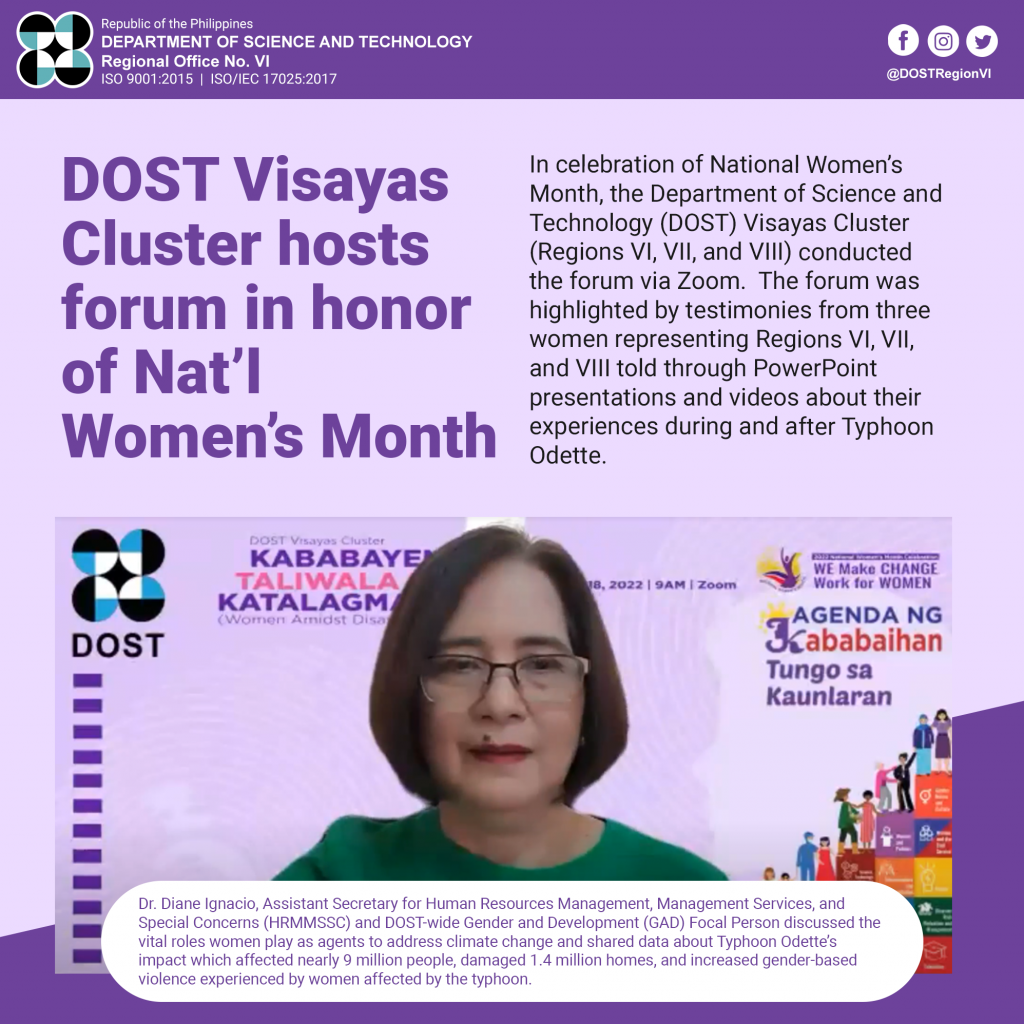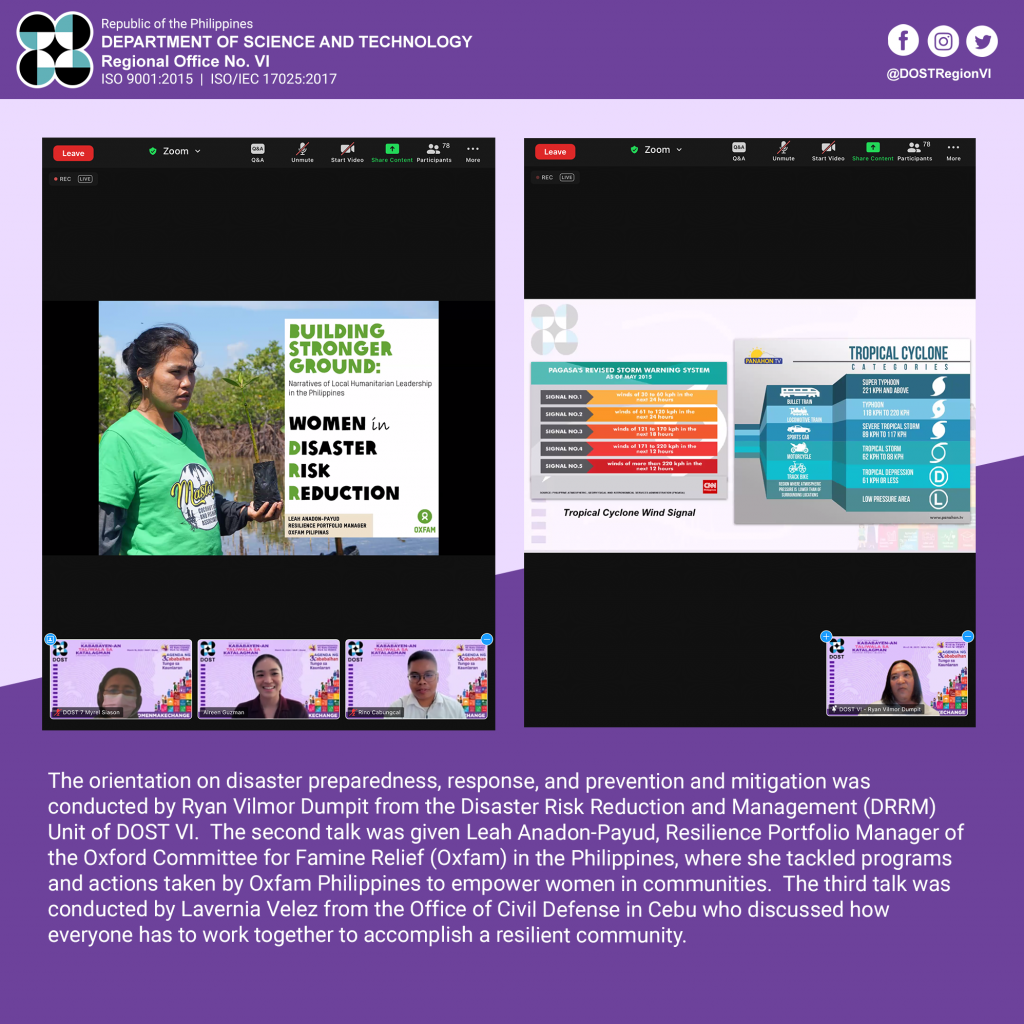DOST Visayas Cluster hosts forum in honor of Nat’l Women’s Month
DOST Visayas Cluster hosts forum in honor of Nat’l Women’s Month
In celebration of National Women’s Month, the Department of Science and Technology (DOST) Visayas Cluster (Regions VI, VII, and VIII) conducted the forum via Zoom.
With the theme, “Kababayen-an Taliwala sa Katalagman (Women Amidst Disasters)”, the forum aims to serve as an avenue for women to express their challenges and inspire actions that empower women in disaster-prone areas in the Visayas.
During the welcome message of DOST VII Regional Director Engr. Jesus F. Zamora, Jr., he encouraged stakeholders to implement collaborative measures on preparedness, response, and mitigation to better withstand future natural disasters.
In addition, Dr. Diane Ignacio, Assistant Secretary for Human Resources Management, Management Services, and Special Concerns (HRMMSSC) and DOST-wide Gender and Development (GAD) Focal Person, also discussed the vital roles women play as agents to address climate change and shared data about Typhoon Odette’s impact which affected nearly 9 million people, damaged 1.4 million homes, and increased gender-based violence experienced by women affected by the typhoon.
The forum was highlighted by testimonies from three women representing Regions VI, VII, and VIII told through PowerPoint presentations and videos about their experiences during and after Typhoon Odette which included the destruction of infrastructures, equipment, and limited supplies resources, seeking help from the National Government Agencies, Local Government Units, and private sectors, and how they eventually overcame the disaster.


The three representatives were Carmel Osmeña-Obida, Vice President of PeacePond Farmers Association in Binalbagan, Negros Occidental, Dorothy Degula, Chairperson, Board of Directors of Cebu Province Mushroom Growers Agri Cooperative in Mandaue City, Cebu, and Nisa Solana, President of Women’s Association of San Bernardo, Limasawa Island.
Following the testimonies were orientations on disaster preparedness, response, and prevention and mitigation where Ryan Vilmor Dumpit from the Disaster Risk Reduction and Management (DRRM) Unit of DOST VI discussing the importance of getting information only from reliable sources such as National Disaster Risk Reduction and Management Council (NDRRMC), Philippine Atmospheric, Geophysical, and Astronomical Services Administration (PAGASA), Hazard Hunter Philippines, Philippine Institute of Volcanology and Seismology (PHIVOLCS), and local DRRM.
Dumpit also emphasized how vital it is to understand warning signs, legends, and technologies normally communicated by the NDRRMC and PAGASA.
Furthermore, a second talk was given Leah Anadon-Payud, Resilience Portfolio Manager of the Oxford Committee for Famine Relief (Oxfam) in the Philippines, where she tackled programs and actions taken by Oxfam Philippines to empower women in communities, stating that with each program, they’ll look at all dimensions of women’s lives to ensure achievement of economic empowerment and their actions are based on gender analysis and immersion.
Anadon-Payud also emphasized the significance of women leaders in DRRM to better address issues women face during disasters.
Moreover, a third talk was conducted by Lavernia Velez from the Office of Civil Defense in Cebu who discussed how everyone has to work together to accomplish a resilient community.
Velez also explained that every process involved in DRRM is interconnected to one another from disaster mitigation, response, and rehabilitation.
She even shared ways to avoid hazards and decrease their impacts such as being well-informed of situations and actions (through drills), having adequate personnel, the proper equipment, and making facilities resilient to hazards.
DOST VI Regional Director Engr. Rowen Gelonga also gave a message of appreciation for the partnership among the three Visayan DOST regional offices stating that the collaboration is not only in GAD but also in other Science and Technology (S&T) Programs including the Small Enterprise Upgrading Program (SETUP), Community Empowerment through Science and Technology (CEST), S&T Scholarships, and Research and Development (R&D), and organizational governance.
Gelonga adds that despite the success of GAD in the country, there’s still a need to further level up the partnership, break barriers, and continually work hand in hand to strengthen alliances and be of better service to stakeholders. (JGagajena, DOST VI-KMU with reports from AMTrabado)

